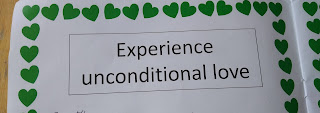Parrotfish
You tend to hear parrotfish before you see them. They nibble loudly on the coral, chewing off the hardened algae with their ‘beak’. I developed a habit of choosing one and following it for as long as my air supply permitted. I was fascinated by them. Apparently they can change sex several times during their lives, which was very progressive 20 years ago. Their pedestrian pace meant I could normally keep up, and their scales glimmered with colours I never knew existed. I was in the lazy summer of my early 20s, lounging in cheap hostel dorms on the Honduran island of Utila while I waited for the new term of adulthood to start.
 |
| A parrotfish |
“How was the dive?”
“Good!” I replied. “Amazing… beautiful.”
“Really?” She shot me a look of weary bemusement that caught me off guard. She was probably in her 50s, and was revisiting some of the haunts of her earlier travels. She'd been gazing out to sea when I came back.
“Yeah. Why?”
“It’s a graveyard,” she said, sighing. “Last time I was here there was coral as far as you could see. Rays… schools of angelfish this big,” she said, like a fisherman regaling me with stories of the one that got away. “Now…” her hands turned into a shrug.
The whole encounter is one I remember vividly. Why was she telling me this? When I went back out the next day I saw the patches of dead coral that I hadn’t seen before. Instead of finding beauty in the fishes of the reef, I started to find the gaps where there were none. It was the same scene, but she had invited me to see it through her eyes, rheumy and jaded, clouded by the past that now framed her present.
 |
| Parrotfish by Kristen Keltz Losoya |
We must be careful to allow today’s generation of schoolchildren to perceive the world they have lived through these last 18 months on their own terms, not through our bleary eyes. Every time we talk about lost learning, or about the need to catch up, we are inviting them to cast their eye over the scene in which they are living and notice the gaps where ‘learning’ used to be. We are asking them to compare their experiences with our halcyon days of yore.
But this is as ridiculous as it is unnecessary. Catch up with what? With an image of what past students would have achieved by now had Covid not torn massive holes through their timetables? What would be the good in that? Why are we asking them to see not what’s there, but what is missing? Why dwell on the parts of the curriculum that we teachers haven’t had time to cover this year? As if the curriculum can ever be ‘completed’ even with 100% attendance. As if this idea of completion doesn’t already come from some illusory boundary we’ve constructed in our collective imaginations.
Lost learning. Over the past 18 months I’ve seen students learn how to use a range of online distance learning platforms; set their own home learning schedules; dial into scheduled video meetings with staff and peers; follow govt press conferences in order to better understand whether school would be open or closed the following week; navigate myriad ever-changing guidelines about how to stay safe during a global pandemic. They’ve learned about ‘r’ rates, droplet vs surface transmission; exponential distributions, zoonosis; herd immunity; asymptomatic transmission, global vaccination programmes, global inequalities in vaccine access...
They've learned about anxiety, uncertainty, loss, bereavement, suffering. But they'll have also learned about how to get through all this and come out the other side. They’ll have learned about mutual aid groups. They’ve learned about the NHS, and about the incredible power and value of science. They’ve learned about why mental health matters, why care homes matter, why neighbours matter, why free school meals matter.
 |
| Parrotfish by Crystal Schrader |
So don’t talk to them about learning loss. And above all let's not deny them the chance to process their lived experience on its own terms. Let's not force them to see it only through our own bloodshot nostalgia. I’m not saying things haven’t been hard for them; there have doubtless been experiences they have missed out on, but I solidly agree with those who say that it will be equally damaging to curate for today’s schoolchildren a narrative in which they always see themselves in deficit.
There will be moments of hardships, as there have always been. But their days hold the potential for moments of beauty that transcend this hardship. Days where all they need to do is follow that parrotfish. Where to experience that beauty all that is needed is to live in their present moment, and not our past.
I’m going to take a break from blogging for a bit while I focus on other things. Have a wonderful summer, and stay safe.



Comments
Post a Comment